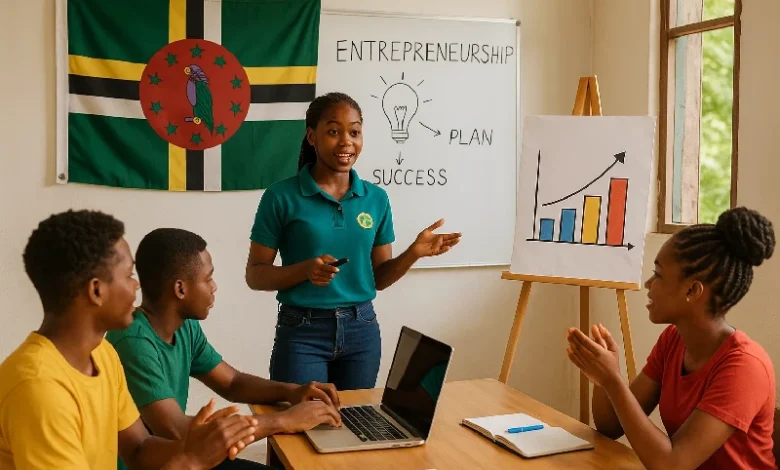Youth Empowerment in Dominica

Youth empowerment in Dominica reflects the country’s commitment to nurturing its younger generation through education, leadership, entrepreneurship, and civic engagement. With over half the population under 35, policies and community programs are increasingly centred on equipping young people with the tools to lead and thrive.
National Policy and Institutional Support
The National Youth Policy of Dominica, first introduced in 2004 and revised in later years, outlines the government’s approach to fostering youth participation in nation-building. It addresses key sectors such as education, employment, environment, culture, and governance. The Youth Development Division, a government agency under the Ministry of Culture, Youth and Sports, spearheads the implementation of these policies, overseeing training programs, volunteer corps, and regional outreach centers.
Programs like the National Youth Council of Dominica (NYCD), established in 1970, play a pivotal role in representing youth interests and coordinating development activities at the community level. These institutions have helped train thousands of young people in leadership, conflict resolution, and civic responsibility.
Education and Skills Development
Access to secondary and tertiary education has improved significantly, with institutions like the Dominica State College (DSC), Newtown Primary School, Isaiah Thomas Secondary School, and technical training centers offering academic and vocational courses. Initiatives like the Youth Skills Training Programme (YSTP) and the National Apprenticeship Programme aim to bridge the gap between school and employment, particularly for those not pursuing traditional academic paths.
Additionally, scholarship opportunities funded by friendly governments, particularly through partnerships with China, Cuba, Venezuela, and regional institutions, continue to expand higher education access for young Dominicans.
Entrepreneurship and Employment
Unemployment remains one of the key challenges facing young persons in Dominica, exacerbated by external shocks such as Hurricane Maria and the COVID-19 pandemic. To address this, the government and non-governmental actors have scaled up entrepreneurial support.
The Dominica Youth Business Trust (DYBT) offers business training, mentorship, and small start-up loans to young entrepreneurs. It has incubated dozens of small businesses, from agriculture and agro-processing to tech and creative industries.
Complementing this are grant and loan initiatives under the AID Bank, as well as capacity-building workshops offered through the National Employment Programme (NEP), which has provided internships and stipends to thousands of young adults across the public and private sectors.
Culture, Sports, and Community Engagement
Dominican youth are heavily involved in cultural and sports initiatives. The annual National Youth Rally, Creole in the Park, National Day Parade, and Community Day of Service all feature strong youth participation. Many young artists, musicians, and writers develop their talents through these outlets.
Sporting programs also remain key to engagement. The Sports Division, in partnership with local clubs, supports youth competitions in football, cricket, netball, and athletics. Schools play a central role in developing future talent, and community-organized leagues have kept rural youth actively involved.
Additionally, movements like the Giraudel-Eggleston Flower Show Youth Club, LEAP (Leadership, Empowerment, and Advocacy Programme), and parish-based initiatives in Grand Bay, Portsmouth, Salisbury, and La Plaine reflect the diversity of youth activity across the island.
Civic and Political Participation
Dominica has seen a rise in youth voices engaging in political, social, and environmental advocacy. The National Youth Parliament, revived with support from the Parliament of Dominica and international partners, offers youth a platform to learn and engage in legislative processes.
Young Dominicans have also become vocal in climate action, especially in the wake of natural disasters. Initiatives tied to the Climate Resilience Execution Agency for Dominica (CREAD) have welcomed youth involvement in community planning and sustainable development. Non-governmental efforts like ISpeak, CARICOM Youth Ambassadors, and the Dominica National Scouts Association offer additional channels for leadership training and regional representation.
Challenges and Outlook
Despite these gains, challenges persist. Youth unemployment, underemployment, access to land and finance, migration pressures, and gaps in mental health support limit opportunities for many. Rural youth in areas like Delices, Wesley, Penville, and Bagatelle often face added disadvantages due to geographic isolation and limited resources.
However, with increasing digital access, greater diaspora engagement, and expanding networks of support, Dominican youth are positioned to continue influencing the island’s direction. The government’s “Build Back Better” post-Maria strategy includes youth-targeted climate resilience and innovation components, further embedding young people into the nation’s recovery and growth.
Final Word
Youth empowerment in Dominica remains a dynamic, evolving process shaped by local realities, cultural heritage, and global opportunities. From classroom to cabinet, from agriculture plots to tech hubs, young Dominicans continue to chart their own paths, actively shaping the future of their nation.




